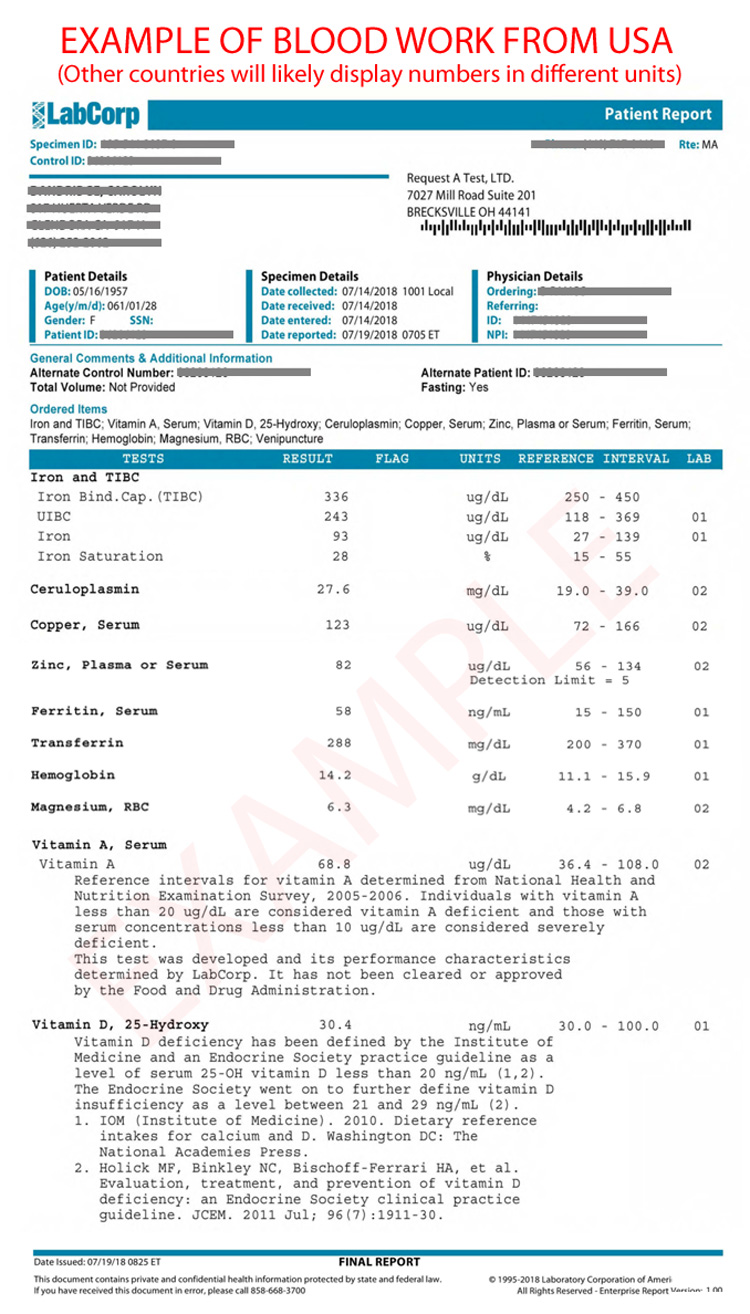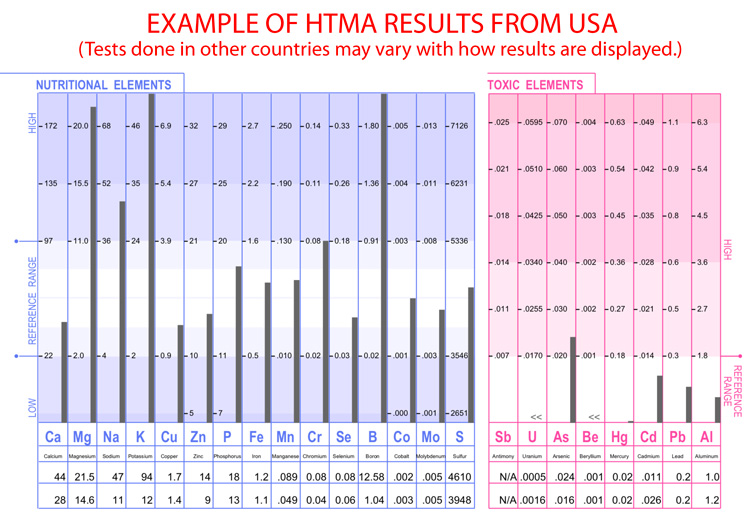What Lab Tests Do We Use?
There are two types of lab tests used by RCP Consultants:
- Blood Work
- Hair Tissue Mineral Analysis (HTMA)
These lab tests are vital to helping you understand your “mineral-stress” pattern during the consult, and for helping you track progress as you follow the steps of The Root Cause Protocol.
Important Note About “Ideal” Values
Everyone wants to know what the “ideal” or “optimal” values should be. This is a perfectly logical question. But please note, that is a very simple question with a very complex answer. Think of it this way: The range of body temperature is 92˚F – 108˚F (or 32˚C – 45˚C). The “ideal” body temperature is supposed to be 98.6˚F (or 37˚C). The closer you get to either “bookend,” the more likely symptoms will appear. The closer you get to “ideal”, the better. But there will always be variation among individuals, so do not look at lab values in a vacuum apart from individual symptoms. For more commentary, please see FAQ: Why don’t we discuss lab test results in online forums?
Blood Work
The “Full Monty” Blood Panel with vitamins A and D measures the following markers. (Included below is a short description of what each test measures, and what I consider to be the “ideal” values for each. But please remember the caveat at the beginning of this page.)
- Iron
- Serum Ferritin
- US Units: 20 ng/mL
- SI Units: 8.9 mmol/L
This measures the protein that stores iron in the tissues.
- Serum Iron
- US Units: ~ 80 ug/dL for women, ~ 100 ug/dL for men
- SI Units: ~ 14.3 umol/L for women, ~ 17.9 umol/L for men
This measures “efficiency” of iron; similar to measuring miles-per-gallon (MPG) in a car.
- Total Iron-binding Capacity (TIBC)
- US Units: ~ 320 ug/dL for women, ~ 333 ug/dL for men
- SI Units: ~ 57.3 umol/L for women, ~ 59.6 umol/L for men
If reported as “% Saturation”, should ideally be 25% for women and 30% for men
This measures how many “docking stations” are available for iron.
- Serum Transferrin
- US Units: ~3.0 g/L
- SI Units: ~ 37.7 mmol/L
This measures the key “transport” protein that “recycles” iron from tissue back into the bloodstream.
- Hemoglobin
- US Units: ~13.0 g/dL for women, ~ 14.0 g/dL for men
- SI Units: ~130 g/L for women, ~ 140 g/L for men
A protein responsible for transporting oxygen, and approximately 70% of our iron is in the hemoglobin.
- Serum Ferritin
- Copper
- Serum Ceruloplasmin
- US Units: ~30 mg/dL
- SI Units: ~0.3 g/L
A marker of “bio-available” copper, which regulates iron.
- Serum Copper
- US Units: ~100 ug/dL
- SI Units: ~15.7 umol/L
Measures the total amount of copper in your blood.
- Serum Ceruloplasmin
- Magnesium
- Magnesium RBC (Red Blood Cell)
- US Units: ~6.5 mg/dL
- SI Units: ~2.67 mmol/L
Measures the amount of magnesium in the red blood cells.
- Magnesium RBC (Red Blood Cell)
- Zinc
- Plasma Zinc
- US Units: ~100 ug/dL
- SI Units: ~15.3 umol/L
Measures the amount of zinc in plasma/serum.
- Vitamin A
- Retinol
- US Units: 65 ug/dL
- SI Units: 2.3 umol/L
Should ideally be 2 – 3 times higher than vitamin D (25(OH)), and measures the amount of “active” vitamin A in your blood.
- Retinol
- Vitamin D
- Storage D (25(OH))
- US Units: ~ 21 ng/mL
- SI Units: ~ 52 nmol/L
Measures the amount of “storage” vitamin D (or calcidiol) in your blood.
- Storage D (25(OH))
- Uric Acid
- US Units: ~5 mg/dL
- SI Units: ~297 µmol/L
- Uric acid is strongly implicated in metabolic syndrome. This measurement helps indicate how much “exhaust” is being produced inside the mitochondria.

Hair Tissue Mineral Analysis (HTMA)
The HTMA test helps to reveal your “mineral-stress” pattern. It is a very useful tool. However, there are no “optimal” or “ideal” numbers, and results are not correlated to your nutrient intake. These numbers (and their ratios) are reviewed during RCP Consults.

Feeling confused?
This can feel very confusing, even overwhelming, and we don’t discuss lab test results in online forums…
So what can you do?
RCP Consultants are experts who have been trained to help you understand your lab results, how they relate to your “mineral-stress” pattern, and how you can implement The Root Cause Protocol to repair mineral imbalance.
Join Our Newsletter
To receive regular updates on RCP news and events, please add your name to the e-newsletter list below.
